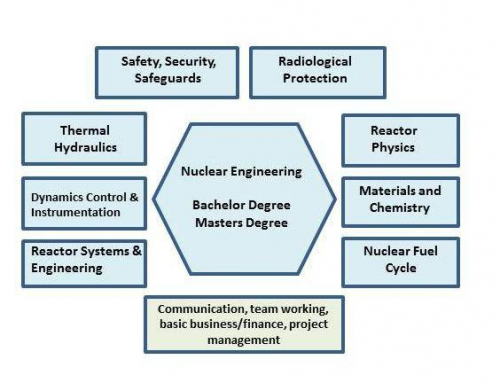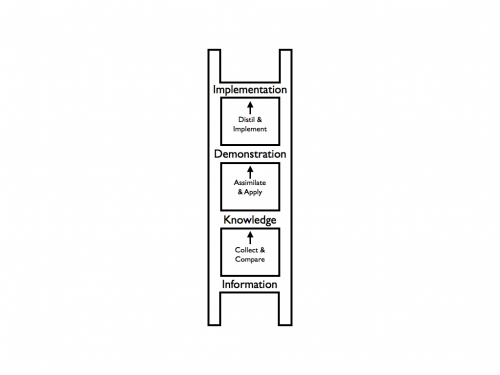Educational programme
Contents
Definition
Educational programme is A set of organized and purposeful learning experiences with a minimum duration of one school-year (or academic year), usually offered in an educational institution Source: Nuclear engineering education: A competence-based approach in curricula development
Summary
One paragraph which summarises the main ideas of the article.
Description
University programmes in nuclear engineering
Engineering education has been offered for many decades along several different tracks. One approach is to have two levels in the academic education: the Bachelor’s, or undergraduate degree, based on approximately three to four years of study at the university level and a more advanced degree, the Master’s, which involves one or two years of study beyond the Bachelor’s. Another approach that has been widely used, especially in Europe, is the Diploma. It typically involves five years of study. A third approach is the Engineer degree consisting of five to six years of study. This has been the tradition in, for example, France, Russian Federation and the Ukraine. This picture is, however, changing. In June 1999, the Ministers of Education in the European Union entered into the Bologna Process (The Bologna Process is a series of ministerial meetings and agreements between European countries designed to ensure comparability in the standards and quality of higher education qualifications. Visit [1] for more details). This has led to the adoption of the Bachelor’s and Master’s degree programmes at most European universities, which replace the Diploma or the Engineer degree. France focuses the nuclear engineering education either at the Engineer degree (five years usually, six years in some instances) within its specific ‘Grandes Ecoles’ approach, or as a Master’s degree (five years) in harmony with the Bologna Process. Russian Federation is taking a two-tier approach in which the Bachelor’s/Master’s programmes will be implemented. This is a key part of the strategy for international engagement. However, the degree of Engineer will be retained in Russian Federation and Ukraine to satisfy the needs of the domestic industry.
Engineering education is country and region dependent. There is no unique model and it is important to adapt pragmatically to the educational, institutional and industrial framework. However, in this report, it is important to specify that the Bachelor’s level can be reached after three to four years, and the Master’s level requires one or two additional years. This amount of time is necessary to acquire the qualifications listed and to become a competent engineer with the required industrial background.
This report deals with the common curriculum requirements resulting from a competence- based approach for the Bachelor’s and Master’s degrees in nuclear engineering, applying to all nuclear application but focusing mainly on nuclear power. The expectations of degree recipients at each level are the following:
- On completion of a Bachelor’s degree level qualification, it is expected that the student will have comprehension and knowledge of nuclear engineering systems and will be able to solve problems and determine technical solutions for real processes;
- On completion of a Master’s degree level qualification, it is expected that the student will be able to analyse, synthesize and evaluate knowledge gained, and apply this knowledge to nuclear power plant systems.
Beyond these expectations, it is further recognized that there are a set of specific outcomes that should result from the completion of the curriculum. At the Master’s degree level (or Engineer’s degree), graduates should be able to demonstrate the following:
- Identify, assess, formulate and solve complex nuclear engineering problems creatively and innovatively;
- Apply advanced mathematics, science and engineering from first principles to solve complex nuclear engineering problems;
- Design and conduct advanced investigations and experiments;
- Use appropriate advanced engineering methods, skills and tools, including those based on information technology;
- Communicate effectively and authoritatively at a professional level, both orally and in writing, with engineering audiences and the community at large, including outreach;
- Work effectively as an individual, in teams and in complex, multidisciplinary and multicultural environments;
- Have a critical awareness of, and diligent responsiveness to, the impact of nuclear engineering activity on the social, industrial and physical environment with due cognisance to public health and safety.
In terms of specific technical areas, the Bachelor’s and Master’s degrees in nuclear engineering bring together a number of key areas that are integrated into a nuclear engineering academic degree programme. This scope is depicted in Figure 2.
The areas shown in the Figure 2 generally represent the key fields of study required to prepare a nuclear engineer for employment in a nuclear power plant. For the nuclear engineer, it is important that these topics are well integrated together to produce a well-prepared graduate who can enter into the training programmes for a specific nuclear power plant and reach the required level of competence to successfully carry out his or her responsibilities for safe, secure and economical operation.
For universities developing new programmes, a more detailed description is useful. In the two following sections, the competencies are defined at both Bachelor’s and Master’s degree levels with the focus on those who will specifically be employed at nuclear power plants. In addition, requirements of the graduate are given in more detail, and involve what each student should possess: a specified level of knowledge (Knowledge), be able to demonstrate - application of the knowledge (Demonstration), and know when to implement the knowledge (Implementation). This can be represented as a ‘knowledge ladder’ (see Figure 3).
Competencies of graduates with a bachelor of nuclear engineering
Requirements for a graduate with a bachelor's degree in nuclear engineering
Competencies of graduates with a master of nuclear engineering
Requirements for a graduate with a master of nuclear engineering
Source: Nuclear engineering education: A competence-based approach in curricula development
References
[1]


